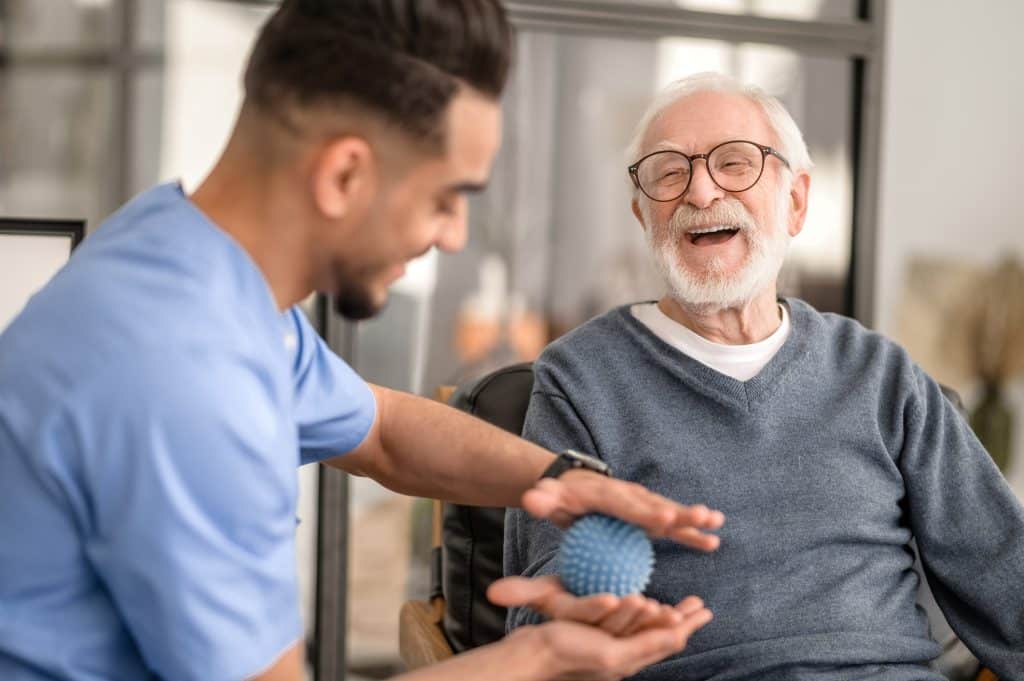Abstract
Dementia is associated with a higher risk of fall injuries and an increased need for the service of physical therapists. With the increased interaction with their healthcare information, patients often feel lost in organizing and managing their healthcare journey. Three physical therapists were interviewed to discuss how to help best patients with cognitive difficulties and how a possible health data management tool, Primary Record, could help improve patient experience. The study found that similar techniques were used to help the patients within similar clinical settings but differed across the various settings. The therapists found that Primary Record was beneficial in patients with complex medical issues and with patients with caregivers.
Introduction: Falls in Dementia Lead to Higher Needs for Physical Therapy
Dementia causes a greater risk of falls in older adults compared to older adults without dementia. This increased fall risk can lead to an increased incidence of injury and, thus, a greater need for the services of a physical therapist (Baker et al. 2011). One study found that older adults with dementia have significantly higher healthcare interactions compared to non-dementia older adults, including higher hospital admission rates, higher average healthcare costs, and more costly care (Lamantia et al. 2016). These increased interactions for older adults with some form of dementia can make their healthcare journey more complex, meaning more doctor visits, possible specialized health visits, and comorbidities. The increase in complexity in their care often compounds the confusion they feel from the disease and increases their reliance on caretakers or family members.
The complex healthcare journey that patients with dementia endure and the support they rely on from a family member or friend has increased the need for technology to help document health information in the modern world. Few studies have examined the use of a family-centered application that allows a care team to support establishing a patient’s health, but one such study in Singapore analyzed how older adults with multiple comorbidities navigated the healthcare world. The results of this study indicate that many factors influence how well older adults can use the healthcare system, including technological literacy, familial support, autonomy, personality, and the complexity of the healthcare system (Lee et al., 2023). While the ability to understand and have personal accountability in the healthcare world varies from person to person, the labyrinth that is the healthcare system is a consistent barrier for all living with or without dementia. This is why tools that help people collect, organize, and share their health information are essential to providing support to those with complex conditions requiring increasing support, such as older adults with dementia. One such tool, Primary Record, is a platform informed by a nurse who spent six years coordinating care for those living with dementia in her community. Given the difficulties in engaging patient interaction with their health data, Primary Record seeks to empower patients to organize and share their data effectively. Primary Record will be the primary focus of this study.
This study will utilize personal interviews with healthcare workers to understand how a tool such as Primary Record can influence patient outcomes. Specifically, three physical therapists, each with varying backgrounds in the field, are interviewed and questioned on the perspectives of working with patients with dementia. The goal of this study is to understand and summarize the pain points of information delivery to older adults with dementia in physical therapy. The results of this study are meant to help design and shape Primary Record and other health information tools, bringing in the perspective of experts in the healthcare field.
Methods: Obtaining Perspectives of Physical Therapists
Three interviews with current and former physical therapists took place in separate virtual video meetings between February and March 2024. The first interview was with a physical therapist with a PhD in aging studies who works at a university and has an extensive background in working with older adults with dementia. The second interview was with a former physical therapist who now works in the health data industry and seeks to improve healthcare interoperability. Then, the last interview was with a currently practicing, full-time physical therapist working on a hospital’s rehabilitation floor. The goal of bringing in diverse backgrounds and areas of expertise was to find unique perspectives that could complement each other and possibly provide varying opinions.
Each therapist was provided with the same set of questions to answer. The questions presented throughout the results section are focused on understanding their experience working with patients with memory or cognitive difficulties, their experience with patients with caregivers, vital information to have with physical therapy, and how they believed Primary Record could impact their treatment.
Results: Interviews with Physical Therapists
The first section of the interview focused on dementia in patients in physical therapy and some of the challenges that the therapists saw. They were asked what they found were the biggest challenges in working with patients with memory difficulties or dementia caused by disease. All three therapists agreed that the biggest challenge is not the physical therapy itself but rather helping the patient more holistically. One home health physical therapist visited patients with dementia in nursing homes and found that a significant difficulty was educating the nurses and other caregivers on how to help the patient best. The social aspect, especially, was crucial in curating effective treatment of the individual and ensuring they are mentally stimulated.
“I think the biggest challenge is remembering what we’ve taught them and having carry over … Perform or do a task that we asked during the session, but then, you know, we see them either the next day, or even even sometimes a few hours later, and they don’t remember what we taught them”
“With any cognitive impairment, it’s a little different because you’re not just like, giving the patient exercises and saying, ‘hey, you got to do this’ … It’s more of a totality of care.”
“You know, I think it’s the sustainability piece, right? Access is an issue, potentially. Quality could be an issue if you have a person who doesn’t have the ability to work effectively with people with memory loss … I think the thing is, our industry in PT doesn’t provide for therapy over a longer time period … So I think, like with anything else, if you don’t really use it, you’ll lose it. So you could, you can get this person to exercise probably, but when you discharge them, how is that going to be sustained depending on their environment they live in?”
The therapists were also asked how they changed their healthcare routines to compensate for patients living with dementia. One physical therapist mentioned that he utilizes much more family and caregiver education than non-dementia patients. This is to ensure that the support team around them can prevent fall injuries and other accidents from happening when the PT is not there. It was also mentioned that repetition of phrases was expected, and adjusting speech to aid in understanding is necessary.
“If you’re going to ask a question, give a choice, don’t give five choices, give two choices, both of which you’re okay with. So you don’t give them the choice and then tell them [that you] can’t do it.”
The next section of the interview focused on the therapist’s experience working with families and caregivers of patients and how this affects their treatment. The therapists were asked about the challenges they typically face when communicating with caregivers. A significant barrier identified was the unavailability of caregivers during physical therapy sessions, which made it difficult to obtain crucial information. Additionally, challenges arose when caregivers were not present to receive progress updates and education on how to best care for the patient.
“They didn’t see the progression or where their family member was. They weren’t able to come visit. They weren’t able to be part of that community and education”
The therapists were asked if they thought there was a trend in caregiver involvement throughout their professional practice. The physical therapist, with experience working in a hospital, noticed the most significant change in the participation of caregivers during the COVID-19 pandemic, where family contact was limited while patients stayed in the hospital. It was found that the barriers created by COVID-19 changed the role of the caregiver to a different form of monitoring, primarily through Zoom calls, phone calls, and other virtual methods of communication. Thinking outside of the COVID-19 context, the physical therapist believed there was a general increase in caregiver involvement throughout her time practicing but pointed out that it is very variable. As healthcare becomes more technologically advanced, resource-poor areas like rural areas may experience more difficulties navigating the healthcare world, especially as a proxy navigator like a caregiver.
“It was a different form of involvement. Actually, they might have been a little more involved, just because they weren’t there every day and seeing everything, so there was a lot more communication”
“I feel like people are becoming more of a proxy to a person’s medical chart and the discussions about what that individual wants for their healthcare or end of life.”
From a broader perspective, the therapists were asked about general physical therapy trends regarding whether they have enough time with patients and what information helps make the case for continued care. All three therapists thought that, in general, they did have enough time to treat their patients, especially in a rehab clinic or outpatient clinic. Once patients are in a rehabilitation center, they almost always reach their desired outcomes, and insurance is not an issue. One physical therapist mentioned that an essential aspect of ensuring that the therapists get the required time with their patients is to document with very detailed notes regarding their progress.
The final section of the interview was about how the interviewees thought Primary Record could improve the patient experience with physical therapy. After the therapists were shown a demonstration, the consensus was Primary Record could be an effective tool for patients to track their physical therapy journey. Bridging the gaps between different health data electronic health records systems was found to be the most significant benefit to the patient from the physical therapists. Also, one physical therapist believes it creates a more straightforward method of communication for a physical therapist and a caregiver, as they can tell the patient any tips or suggestions to put in the app, and the caregiver and patient can look at those outside of the meeting.
“From the PT perspective … I think having everything there, if it was from multiple hospitals and it was pulled in and accurate, it helps give the PT an understanding of all the providers, all the people who are in play with this person’s care and who may or may not be missing, you know, from that potentially. I also think it gives context to like, are they able to access the care of their gaps in their care”
Discussion: Impact of Primary Record
The results of these interviews shed light on some of the experiences and opinions seen in the field of physical therapy today. While no conclusions can be drawn regarding the distribution of physical therapists’ experiences or large-scale recommendations on how to treat patients with dementia best, this qualitative design was intended to display a glimpse of the opinions and experiences that some experts in the field have and explore how Primary Record could impact their treatment.
The therapists provided insight into their personal challenges and solutions when treating patients with cognitive difficulties. Each therapist had different obstacles when treating these patients, especially between different clinical settings. When treating patients in their homes or at a skilled nursing facility, therapists who worked in this setting emphasized patient and caregiver education, including preparing safety measures, how to best help the patient move and fall prevention techniques. The home health setting also allowed the therapist to find potential hazards and help them adjust their living conditions to best aid the patient. In a hospital or outpatient setting, however, most of the work with the patient was focused on rehabilitating the point of interest, with special techniques added to ensure the patient with memory difficulties felt less confused. In the experience the physical therapists had in clinical settings outside the patient’s home, they would have to ask the patient or caregiver about the home to help prevent future falls. Finally, socialization was found to be particularly important in aiding the cognition of the dementia patient, according to the interviewees.
Overall, the three physical therapists all found Primary Record to be a positive and beneficial tool for the future of health information management. Primary Record was particularly effective in patients with dementia or cognitive difficulties and in patients with caregivers or a large caregiving team. The tools given to empower these patients were thought to help facilitate more effective communication between therapist and patient, potentially providing a less challenging experience. The opinions of these experts are of utmost importance to a company such as Primary Record because of their vast experience in the healthcare field, and their feedback can help shape the application to be best suited for patient experience.
Because this study was limited to three individual interviews, qualitative data sources from more physical therapists and other clinical experts could be beneficial to understanding how patients with dementia could benefit from Primary Records. This study was also limited by virtual communication rather than in-person interviews, as well as some time constraints, which limited the extent to which the therapists could give their responses. Quantitative data involving surveys of patients or clinicians could also provide valuable insight into how a tool such as Primary Record could be used most effectively.
References
Fjellman-Wiklund, A., Nordin, E., Skelton, D. A., & Lundin-Olsson, L. (2016). Reach the Person behind the Dementia – Physical Therapists’ Reflections and Strategies when Composing Physical Training. PloS one, 11(12), e0166686. https://doi.org/10.1371/journal.pone.0166686
LaMantia, M. A., Stump, T. E., Messina, F. C., Miller, D. K., & Callahan, C. M. (2016). Emergency Department Use Among Older Adults With Dementia. Alzheimer disease and associated disorders, 30(1), 35–40. https://doi.org/10.1097/WAD.0000000000000118
Lee, P. S. S., Chew, E. A. L., Koh, H. L., Quak, S. X. E., Ding, Y. Y., Subramaniam, M., Vaingankar, J. A., & Lee, E. S. (2023). How do older adults with multimorbidity navigate healthcare?: a qualitative study in Singapore. BMC primary care, 24(1), 239. https://doi.org/10.1186/s12875-023-02195-2
Perttila, N. M., Öhman, H., Strandberg, T. E., Kautiainen, H., Raivio, M., Laakkonen, M. L., Savikko, N., Tilvis, R. S., & Pitkala, K. H. (2017). How Do Community-Dwelling Persons with Alzheimer Disease Fall? Falls in the FINALEX Study. Dementia and geriatric cognitive disorders extra, 7(2), 195–203. https://doi.org/10.1159/000477394
Salloch, S., Otte, I., Reinacher-Schick, A., & Vollmann, J. (2018). What does physicians’ clinical expertise contribute to oncologic decision-making? A qualitative interview study. Journal of evaluation in clinical practice, 24(1), 180–186. https://doi.org/10.1111/jep.12840
Toots, A., Wiklund, R., Littbrand, H., Nordin, E., Nordström, P., Lundin-Olsson, L., Gustafson, Y., & Rosendahl, E. (2019). The Effects of Exercise on Falls in Older People With Dementia Living in Nursing Homes: A Randomized Controlled Trial. Journal of the American Medical Directors Association, 20(7), 835–842.e1. https://doi.org/10.1016/j.jamda.2018.10.009
van Doorn, C., Gruber-Baldini, A. L., Zimmerman, S., Hebel, J. R., Port, C. L., Baumgarten, M., Quinn, C. C., Taler, G., May, C., Magaziner, J., & Epidemiology of Dementia in Nursing Homes Research Group (2003). Dementia as a risk factor for falls and fall injuries among nursing home residents. Journal of the American Geriatrics Society, 51(9), 1213–1218. https://doi.org/10.1046/j.1532-5415.2003.51404.x







